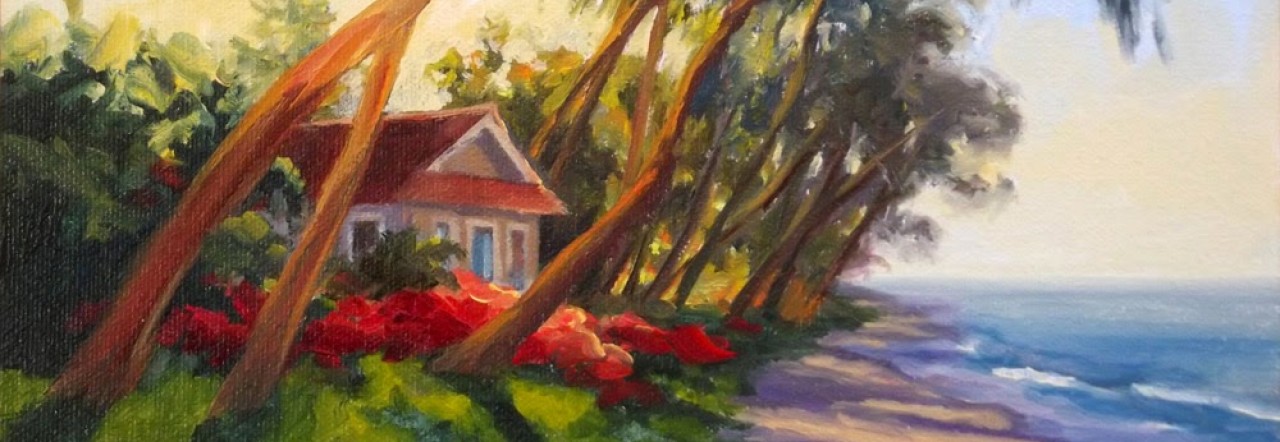FROM FATHER TO DAUGHTER
by T. J. Banks, http://www.tjbanks927.blogspot.com/
The morning sun is glinting down on my father’s still wavy gray hair as we stand there in the field among the blue spruces. It’s my first time planting a tree: he shows me how to push down on the edge of the shovel with my foot as I dig, how to mold and flatten the earth around my sapling afterwards. There isn’t much conversation, just a kind of quiet companionship, strong and warm as the sun on our faces….
I spent a lot of time with my father growing up. I was born when he was almost 46. He had told my mother that he was too old for another child; but he was delighted when I appeared, complete with the thick dark hair and the wide cheekbones we’d both inherited from his Romanian mother. My first job was with him, fetching and toting his tools after school or on weekends, when he did his on-the-side storm-door and window repairs. Fifty cents a window, two dollars a door, and I got to stay in the car until he needed me when the weather was cold.
The words “absentee father” were not anywhere in his vocabulary — partly because he and my mother had buried three of their six children by the time I was 14 and partly because of who he was: a down-to-earth guy who showed his love in down-to-earth ways. He was a man of great heart. Which was ironic because, medically speaking, his was a weak one, badly scarred from the attacks he’d had when I’d been a child. But he didn’t — wouldn’t — let that stop him. He was the hardest-working man I ever met. “I’m better when I’m working,” he’d insist. Or, “You don’t quit when you’re half-way finished.” Or, “It doesn’t matter if you fail ten times — you keep on trying.”
Did we ever fight? Naturally. But somewhere in mid-argument, I’d inevitably glance down and realize that we were standing with our heads tilted at precisely the same angle, using precisely the same gestures. Mom walked in once in a while when we were in mid-argument and started cracking up. She turned to my father and said, “She’s stubborn, just like you.”
Dad and I looked at each other. The words just sprang out of my mouth. Athena leaping from Zeus’ head in full armor. “I had to get it from somewhere,” I blurted.
“That’s right,” Dad said approvingly, and the argument fish-flopped on the floor and died.
There was only one time when we were seriously out of harmony with each other. Dad had just retired and was restless; I had just transferred to a local college and was wondering if I’d made another mistake. We were at home with each other a lot and sniped at each other a lot in our frustration.
But, in that curious ebb-and-flow of relationships, things somehow righted themselves. By fall, Dad had gotten himself a part-time job, and I had settled into the new college. Shortly afterwards, his sister came for a visit. She pulled out her camera — Dad and I looked at each other — and, suddenly, we moved together and put our arms around each other, the temporary coldness between us forgotten.
Dad died a year-and-a-half later of a cerebral hemorrhage. A few years later, I wrote a short piece, “Watching,” that eventually found its way into a literary journal called Writing For Our Lives. Written in the present tense, it’s a fictional account of the last time I visited him in the hospital, a few days before a fever took over and burnt his tired body out, setting his spirit free. Like my heroine, I made the conscious decision not to come back and see him again: he no longer knew who we were, and I knew he wouldn’t want to be remembered that way….
What I remember instead is the man who taught me how to plant trees and a score of other things. And I remember — it’s the oddest memory, just a flicker in time or one of those strange snapshots your mind takes sometimes — how one day, when I was in college, the portrait studio where I was working closed early. Needing a ride, I walked over to the local Stop & Shop. Dad was there by the courtesy counter, getting his coffee or talking to someone he knew, just as he did every day at about that time. See, I almost always knew where to find him; and on the rare occasions when I didn’t, he found me. That is how it is with people you love.
“Death ends a life, not a relationship,” a dying Morrie Schwartz tells his friend and protégée in Mitch Albom’s Tuesdays with Morrie. I learned the truth of those words for myself when I lost Dad. But I didn’t really lose him. His body might have gone to earth, but I’d hear his voice — low, deep, and rough around the edges, with its slight New England accent — coming out of nowhere, plain-speaking but kind, just when I needed it most. Only once, after my husband Tim’s sudden death did that voice grow faint, so lost in this new harder-to-understand grief was I.
I couldn’t find Dad then, but he found me. One morning, shortly after I started running, he was there, real as the road beneath my sneakered feet and the birdsong all around me. And, as I ran, I began a series of conversations with him — about Tim, about relationships, about my writing, and, of course, about his namesake, my daughter Marissa.. His voice came back at me, strong and sure and comforting as it had been in life. We haven’t stopped talking since. After all, that is how it is with people you love.

